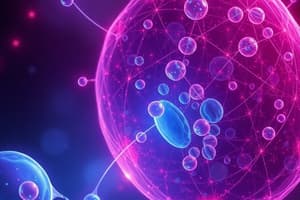Podcast
Questions and Answers
What is the result of chromatids being pulled apart during cell division?
What is the result of chromatids being pulled apart during cell division?
- Each cell will have double the number of chromosomes.
- Each cell will have 23 chromosomes.
- Each cell will have 46 chromosomes. (correct)
- Each cell will have no chromosomes.
What is the total number of homologous pairs of chromosomes in human cells?
What is the total number of homologous pairs of chromosomes in human cells?
- 23 pairs (correct)
- 22 pairs
- 24 pairs
- 46 pairs
Why is it necessary to condense DNA before mitosis?
Why is it necessary to condense DNA before mitosis?
- To ensure that DNA is more accessible for replication.
- To allow for easier organization and distribution of chromosomes. (correct)
- To prevent chromosomal damage during separation.
- To enable the expression of genes during cell division.
Which statement accurately describes gametes?
Which statement accurately describes gametes?
In which scenario are karyotypes most useful?
In which scenario are karyotypes most useful?
Flashcards
What is a karyotype?
What is a karyotype?
A karyotype is an organized image of all the chromosomes in a cell. It shows the size, shape, and number of chromosomes.
Why are chromosomes condensed during Mitosis?
Why are chromosomes condensed during Mitosis?
Chromosomes condense into thick, tightly packed structures during mitosis to prevent tangling and ensure that each daughter cell receives a complete set of chromosomes.
What are homologous chromosomes?
What are homologous chromosomes?
Homologous chromosomes are pairs of chromosomes that have the same size, shape, and genes. They are inherited one from each parent.
What is a gamete?
What is a gamete?
Signup and view all the flashcards
What is fertilization?
What is fertilization?
Signup and view all the flashcards
Study Notes
Chromosome Behavior
- Chromatids separate and each cell will have 46 chromosomes
- A gene specific to stomach cells is turned off in the eye cells
- A karyotype is an image of all chromosomes
- Condensing DNA before mitosis is important because it will be a challenge without condensed packaging
Homologous Pairs
- Homologous pairs have the same size
- Homologous pairs have the same genes
- Humans have 23 pairs
- Humans have 22 pairs of autosomes
- 1 pair of sex chromosomes
- Eye color is a trait controlled by a gene on an autosome
Gametes
- Gametes are sex cells.
- Contain half the number of chromosomes as a body cell
- Gametes contain 23 chromosomes
- Fertilization of an egg and sperm results in a zygote
- A zygote has 46 chromosomes
- Haploid is 23
- Diploid is 46
Karyotypes
- Karyotypes are most useful in diagnosing genetic disorders.
Studying That Suits You
Use AI to generate personalized quizzes and flashcards to suit your learning preferences.




